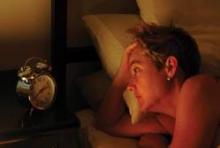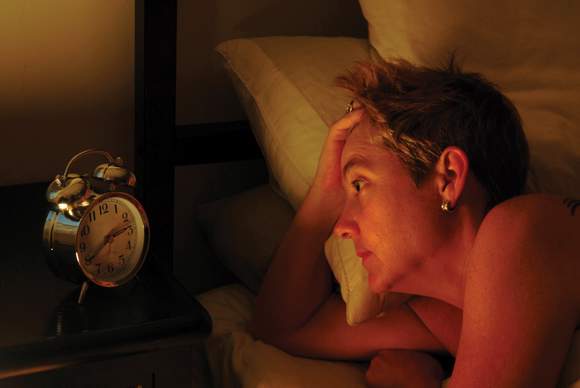User login
WASHINGTON – Individuals suffering from migraine who also regularly experience insomnia are highly predisposed to developing anxiety and depression, according to a population-based study presented at the annual meeting of the American Headache Society.
“Treating comorbid conditions, such as anxiety and depression, is an essential part of optimal treatment of migraine,” explained Dr. Min Chu of Hallym University in Anyang, South Korea. “However, anxiety and depression, even in migraineurs, are usually underdiagnosed and undertreated, [and] the association between insomnia and anxiety and depression among migraineurs in a population-based setting is still unknown.”
Dr. Chu and his coinvestigators selected a sample of 2,762 participants aged 19-69 years who underwent screening with the Insomnia Severity Index (ISI), Goldberg Anxiety Scale, and Patient Health Questionnaire–9 to determine each patient’s severity for each symptom. ISI scores equal to or greater than 15 were considered indicative of insomnia severe enough to potentially cause anxiety or depression. Evaluations for each subject were administered via a face-to-face, 60-item, semistructured interview.
Of 147 subjects found to have migraine in the previous year, 57 (38.8%) had insomnia, 45 (30.6%) had anxiety, and 26 (17.7%) had depression. Of the 57 migraineurs who also had insomnia, 50.9% had anxiety and 31.6% had depression. Logistic regression models ultimately showed that migraine and insomnia together create heightened odds for anxiety (odds ratio, 4.8; 95% confidence interval, 2.3-10.1) and depression (OR, 4.7; 95% CI, 1.9-11.8) (P < .001 for all). Out of the total population, 274 subjects (10.0%) had anxiety, 124 (4.5%) had depression, and 120 (4.3%) had insomnia.
“Insomnia, anxiety, and depression showed a close association in a population-based sample,” Dr. Chu said. “This association persisted among migraineurs, and more than two-thirds of migraineurs with insomnia have anxiety or depression.”
He added that it is critical for health care providers to assess insomnia in migraineurs to accurately treat anxiety and depression as well.
Dr. Chu did not report any relevant financial disclosures.
WASHINGTON – Individuals suffering from migraine who also regularly experience insomnia are highly predisposed to developing anxiety and depression, according to a population-based study presented at the annual meeting of the American Headache Society.
“Treating comorbid conditions, such as anxiety and depression, is an essential part of optimal treatment of migraine,” explained Dr. Min Chu of Hallym University in Anyang, South Korea. “However, anxiety and depression, even in migraineurs, are usually underdiagnosed and undertreated, [and] the association between insomnia and anxiety and depression among migraineurs in a population-based setting is still unknown.”
Dr. Chu and his coinvestigators selected a sample of 2,762 participants aged 19-69 years who underwent screening with the Insomnia Severity Index (ISI), Goldberg Anxiety Scale, and Patient Health Questionnaire–9 to determine each patient’s severity for each symptom. ISI scores equal to or greater than 15 were considered indicative of insomnia severe enough to potentially cause anxiety or depression. Evaluations for each subject were administered via a face-to-face, 60-item, semistructured interview.
Of 147 subjects found to have migraine in the previous year, 57 (38.8%) had insomnia, 45 (30.6%) had anxiety, and 26 (17.7%) had depression. Of the 57 migraineurs who also had insomnia, 50.9% had anxiety and 31.6% had depression. Logistic regression models ultimately showed that migraine and insomnia together create heightened odds for anxiety (odds ratio, 4.8; 95% confidence interval, 2.3-10.1) and depression (OR, 4.7; 95% CI, 1.9-11.8) (P < .001 for all). Out of the total population, 274 subjects (10.0%) had anxiety, 124 (4.5%) had depression, and 120 (4.3%) had insomnia.
“Insomnia, anxiety, and depression showed a close association in a population-based sample,” Dr. Chu said. “This association persisted among migraineurs, and more than two-thirds of migraineurs with insomnia have anxiety or depression.”
He added that it is critical for health care providers to assess insomnia in migraineurs to accurately treat anxiety and depression as well.
Dr. Chu did not report any relevant financial disclosures.
WASHINGTON – Individuals suffering from migraine who also regularly experience insomnia are highly predisposed to developing anxiety and depression, according to a population-based study presented at the annual meeting of the American Headache Society.
“Treating comorbid conditions, such as anxiety and depression, is an essential part of optimal treatment of migraine,” explained Dr. Min Chu of Hallym University in Anyang, South Korea. “However, anxiety and depression, even in migraineurs, are usually underdiagnosed and undertreated, [and] the association between insomnia and anxiety and depression among migraineurs in a population-based setting is still unknown.”
Dr. Chu and his coinvestigators selected a sample of 2,762 participants aged 19-69 years who underwent screening with the Insomnia Severity Index (ISI), Goldberg Anxiety Scale, and Patient Health Questionnaire–9 to determine each patient’s severity for each symptom. ISI scores equal to or greater than 15 were considered indicative of insomnia severe enough to potentially cause anxiety or depression. Evaluations for each subject were administered via a face-to-face, 60-item, semistructured interview.
Of 147 subjects found to have migraine in the previous year, 57 (38.8%) had insomnia, 45 (30.6%) had anxiety, and 26 (17.7%) had depression. Of the 57 migraineurs who also had insomnia, 50.9% had anxiety and 31.6% had depression. Logistic regression models ultimately showed that migraine and insomnia together create heightened odds for anxiety (odds ratio, 4.8; 95% confidence interval, 2.3-10.1) and depression (OR, 4.7; 95% CI, 1.9-11.8) (P < .001 for all). Out of the total population, 274 subjects (10.0%) had anxiety, 124 (4.5%) had depression, and 120 (4.3%) had insomnia.
“Insomnia, anxiety, and depression showed a close association in a population-based sample,” Dr. Chu said. “This association persisted among migraineurs, and more than two-thirds of migraineurs with insomnia have anxiety or depression.”
He added that it is critical for health care providers to assess insomnia in migraineurs to accurately treat anxiety and depression as well.
Dr. Chu did not report any relevant financial disclosures.
AT THE AHS ANNUAL MEETING
Key clinical point: Individuals suffering from migraines who also experience insomnia are at higher risk for develop anxiety and depression.
Major finding: A total of 66% of individuals who had both migraines and insomnia also experienced either anxiety or depression.
Data source: A population-based study of 2,762 South Koreans, aged 19-69 years.
Disclosures: Dr. Chu did not report any relevant financial disclosures.

